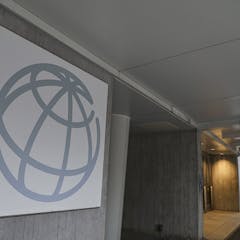
Articles on International Monetary Fund
Displaying 1 - 20 of 57 articles

Kenya is not an isolated case. Twenty-one countries are receiving IMF support.

Kenyan activism is witnessing a shift from ethnic-based mobilisation to issue-based activism.

Infrastructure is always a vexed issue. The program is full of pork barrelling, whoever is in power. Even when that’s not involved, what to build and when it should be built is often contested.

The World Bank and IMF need to continue evolving if they are to remain fit for purpose in the 21st century.

The conditions placed on countries borrowing money from the International Monetary Fund have further disadvantaged these countries economically.

The bank has set hares running by forecasting actual growth of the UK economy in 2023, while most other forecasters are more downbeat.

Debt forgiveness isn’t the answer. History is replete with examples of countries that are serial defaulters.

Thirty years ago the World Bank recognised that its position was untenable. It put in place mechanisms to make the bank more accountable to ordinary people.

Former prime minister emerges from assassination attempt wounded, but vowing to continue protest against government.

El Salvador’s President Nayib Bukele thought making Bitcoin legal tender would revolutionise his country’s economy, He was wrong.

The IMF sends its staff on two types of mission to member countries: to assess the state of the country’s macro economy or to assess the need for financial support.

Sri Lankans are contending with growing levels of starvation, death and disruption. Now they are also facing the brutal violence of the state.

Rich nations need to provide far greater climate adaptation financing to low income countries and plug the holes that siphon their limited fiscal resources to tax havens.

Allegations that World Bank officials manipulated country rankings in its much-used ease of doing business index highlight a deeper problem with these types of rankings.

The IMF’s injection of US$650 billion worth of Special Drawing Rights into the global economy opens a window for African countries to reform their relationship with the fund.

Nixon’s decision left the IMF without a clearly defined role. Under the leadership of the industrialised countries, it began to fashion a new more intrusive and ideological role.

IMF programmes run the risk of having too many conditions. This may drive countries into financial disaster. And back to the IMF again.

Expert background on Haiti, where President Jovenel Moïse’s July 7 killing is the latest in the Caribbean nation’s long list of struggles.

The inefficient vaccine allocation rules currently in place must be replaced by new cooperative institutional structures and more concrete steps by the Group of Twenty (G20) countries.

The development strategy based on foreign investment in natural resources projects has not delivered economic growth or security. What’s needed is an inclusive vision based on local realities.
